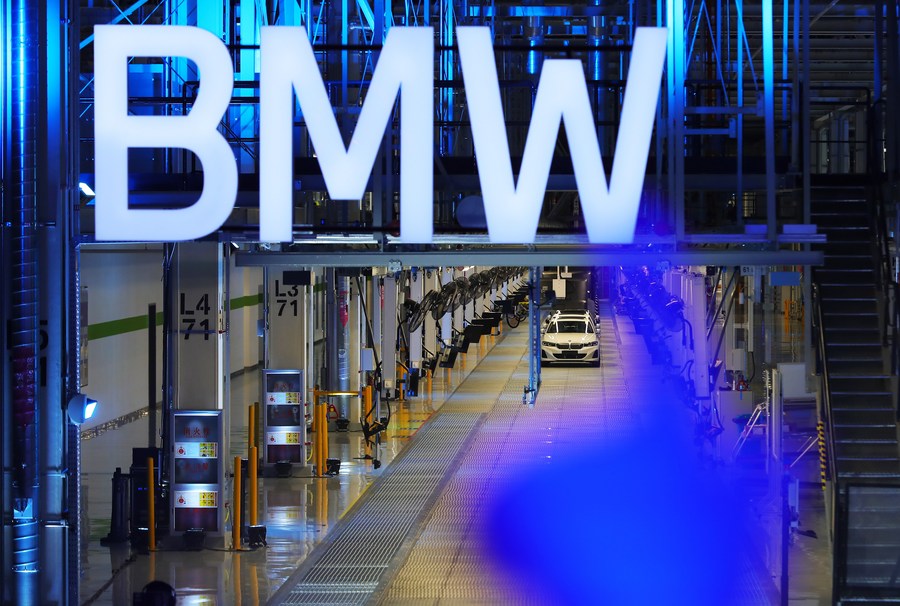NEV industry recharges China's old industrial base

BMW i3 electric cars are pictured during the inauguration ceremony of Plant Lydia of BMW Brilliance Automotive (BBA) in Tiexi District of Shenyang, northeast China's Liaoning Province, June 23, 2022. (Xinhua/Yang Qing)
SHENYANG, April 7 (Xinhua) -- Boasting a reputation as an auto industrial center stretching over several decades, northeast China's old industrial base is readying itself for a new wave.
From establishing a layout for the battery industry to drawing manufacturers of new energy vehicles, the region again takes on an important role in China's automobile industry.
In Tiexi District of Shenyang City, capital of Liaoning Province, which was once the beating heart of the former industrial powerhouse, the NEV industry is taking off.
It is estimated that by 2030, the output value of the new energy industry of Tiexi will reach 100 billion yuan (about 14.53 billion U.S. dollars), with the formation of relevant industrial clusters such as lithium batteries, hydrogen energy, and energy storage.
In March, EVE Energy Co., Ltd, one of China's leading lithium-ion battery manufacturers, broke ground on a 10-billion-yuan battery production base in Tiexi.
The project will connect the upstream and downstream industrial chains, contributing to the district's construction of an industrial battery center, said Guo Zhongxiao, the district Party chief.
Along with German auto behemoth BMW's battery production project in Shenyang, the Chinese battery manufacturer's production base offered a glimpse of the region's booming new energy vehicle industry.
After building its Shenyang production base into the group's largest one globally, the German carmaker chose to take a crucial step in its e-mobility strategy in China by further cooperating with the region and investing in the new energy project of a 10-billion-yuan battery production project in the same district.
In 2022, the German marque saw its sales of electric models maintain strong growth, with some 42,000 electric vehicles delivered to customers in the Chinese market, up 91.6 percent year on year.
"The relevance of the Chinese market for BMW remains enormous, particularly regarding electric vehicles," a company spokesperson told Xinhua. In 2023, the carmaker expects China's share of total battery-electric vehicle sales to "continue to rise significantly."

This photo taken on March 20, 2023 shows the site of a groundbreaking ceremony of a battery production base of EVE Energy Co., Ltd, one of China's leading lithium-ion battery manufacturers, in Shenyang, northeast China's Liaoning Province. (Xinhua/Yu Yetong)
Another prominent global player eyeing the potential of the region is German luxury carmaker Audi AG.
Cooperating with China's leading automaker FAW Group Co., Ltd., the company invested over 30 billion yuan into a NEV project in Changchun City, Jilin Province, regarded as the cradle of China's auto industry.
The Audi FAW NEV project, the German automaker's first production base specifically for purely electric vehicles in China, is expected to be completed and operational at the end of 2024, with a designed annual production capacity of 150,000 vehicles.
Likewise, for the U.S. electric automaking giant Tesla, the marketing potential, sound business environment, abundant research and development resources, quality infrastructure, and skilled human resources make the region a second-to-none magnet.
In the harbor city of Dalian, Tesla China's showrooms and delivery centers have gained significant popularity and traffic since the electric automaker slashed the prices of its popular China-made models early this year.
"Electric cars previously deemed unfit for northeast China's cold weather are gaining popularity among consumers due to improved battery and management technology, extended driving range, and expanded charging networks," said Ma Li, Regional General Director of Tesla China.
To tap into the promising market, Tesla joins the province's efforts to prop up electric vehicle consumption and the fast-track development of the relevant infrastructure facilities by building the supercharger network and stores.
At the end of 2022, there were 798 charging stations in Liaoning Province, including 184 in Shenyang. This means electric vehicle drivers can find a charging station every 6 kilometers or 15 minutes of driving in the city, continually improving the travel experience that electric vehicles bring.
"The new-energy vehicle industrial chain layout helps promote industrial agglomeration and accelerate the construction of a modern industrial system. Liaoning will activate and expand new development drivers with a green development concept and further promote the high-quality development of old industrial bases," said Liang Qidong, vice president of the Liaoning Academy of Social Sciences.
Fueled by the future-oriented industry developing at full throttle, the "rust-belt" region aims to play a significant role in the country's manufacturing industry once again and is upbeat about the future.
Photos
Related Stories
- China, N. Ireland to boost cooperation on new energy
- China's annual power generation from wind, solar energy surpasses 1 tln kWh in 2022
- China's Hebei sees growing new energy power generation capacity
- Chinese new energy buses gallop into Arab market
- China's power battery output surges 98.1 pct in October
Copyright © 2023 People's Daily Online. All Rights Reserved.









